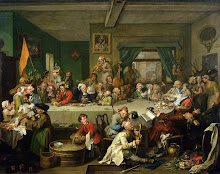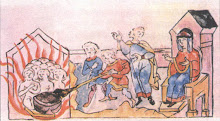
In October of 1845, the corpse of a prostitute named Maria (or Mary Ann) Bickford was found in her Boston boardinghouse lodgings, her throat gruesomely slashed. Her former lover, a wealthy, married man named Albert J. Tirrell, immediately became the prime suspect. Although he made attempts to flee the country, he was soon arrested and brought back for trial. The circumstantial evidence against him seemed overwhelming, and his own personal character had long been an object of public scandal (one observer noted that he and Bickford had, between them, accounted for “a rather high percentage of moral turpitude.”) However, Tirrell had two very important factors in his favor: A high-powered defense attorney, former U. S. Senator Rufus Choate, and a public who had decided the slain “fallen woman” was a mere Jezebel who brought doom upon herself.
Choate and the rest of Tirrell’s defense team, as all good attorneys do when faced with a seemingly hopeless client, did their best to put the jury into a state of utter discombobulation. First, they argued Bickford had committed suicide, the “natural death of persons of her character.” Then, they tried insinuating someone else in the boardinghouse was the true culprit. Finally, perhaps unable to convince even themselves of those possibilities, they brought on a parade of witnesses ready to testify that Tirrell had long suffered from somnambulism. If Tirrell killed Bickford, Choate declared, it was when he was in this hypnotic-like state, and thus could not be held accountable for the tragedy.
This was good enough for the judge. His instructions to the jury stressed the victim’s dubious character, and suggested that Tirrell’s alleged sleepwalking could be seen as a form of exculpatory insanity. Tirrell was duly acquitted of murder, although he was forced to spend three years in state prison for “adultery and lascivious cohabitation.” Choate, who subsequently became understandably popular with America’s criminal classes, went on to become the Attorney General of Massachusetts, but the Tirrell trial proved to be his real legacy. After his death, he was remembered as the lawyer who “made it safe to murder."
What does this sordid little story have to do with the World of Poe, you ask?
Not long before Bickford’s bloody demise, Tirrell was in New York City, nursing dreams of glory. Although he knew nothing of the publishing business, he wished to launch a periodical of national influence, one that would transform the American literary scene. Who better to help him realize this lofty goal, Tirrell reasoned, than Edgar Allan Poe? He called on the author/editor--this meeting evidently took place sometime during the short life of the “Broadway Journal”--and offered him “exclusive editorship and control” of his planned publication.
Poe has often been unkindly stereotyped as a feckless man with no head for business and little understanding of human nature, but he clearly could read people better than your average Boston juror. He failed to share his would-be colleague’s enthusiasm.
Tirrell’s biographer depicted him as urging the poet to accept his munificent offer, pleading, “The people want knowledge; they thirst for it as the heart [sic] panteth for the water brooks.” ("He seemed to be possessed of a belief that if he brought some doubled sheets of printed paper before the people, and the ladies in particular, an illumination as wonderful as the aurora borealis would be the consequence.")
Poe, after a “cautious and analytical survey of the gentleman,” “propounded divers queries which Tirrell had not the capacity to answer.” Finally, he told his caller, “engagements compel me to decline your generous offers; I have already promised to do more than I can possibly accomplish.” Poe suggested Tirrell bring his proposals to a Silas Estabrook, “a compositor of my acquaintance whose talents are so nearly like your own that he would prove the very person you are seeking.”
Unfortunately, Poe was right in his estimation of Estabrook’s compatibility with Tirrell. The two subsequently collaborated on “The Unexpected Letter: A Truthful Journal of News and Miscellany,” which proved an immediate disaster. The enormous, wildly ambitious initial costs of the venture, coupled with Tirrell’s chronic "rattle-headedness," sank the publication before it even began. (Estabrook, who saw himself as the dupe of his unconventional business partner, found consolation by publishing a tell-all booklet about Tirrell's crimes that included the anecdote above.) Tirrell and Poe apparently never met again while achieving, in their very different ways, memorable places in history.
Researcher Harry Koopman wrote, “[Tirrell’s] offer may be regarded as a tribute to Poe’s prominence in the literary world.” The encounter can also be regarded as even more eloquent tribute to Poe’s underrated prominence as an escape artist.
Unfortunately, Poe was right in his estimation of Estabrook’s compatibility with Tirrell. The two subsequently collaborated on “The Unexpected Letter: A Truthful Journal of News and Miscellany,” which proved an immediate disaster. The enormous, wildly ambitious initial costs of the venture, coupled with Tirrell’s chronic "rattle-headedness," sank the publication before it even began. (Estabrook, who saw himself as the dupe of his unconventional business partner, found consolation by publishing a tell-all booklet about Tirrell's crimes that included the anecdote above.) Tirrell and Poe apparently never met again while achieving, in their very different ways, memorable places in history.
Researcher Harry Koopman wrote, “[Tirrell’s] offer may be regarded as a tribute to Poe’s prominence in the literary world.” The encounter can also be regarded as even more eloquent tribute to Poe’s underrated prominence as an escape artist.
(Image via the fascinating early American crime site Murder By Gaslight)
















